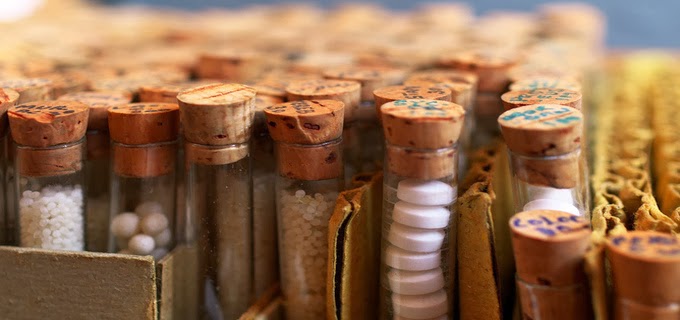In intractable diarrhoea which
does not respond to any other medicine, especially when associated with
inflammation of the glands, one should not forget Cistus. Similarly, the chronic cold in a patient
who has the disposition of Cistus will not be treatable with any other kind of remedy.
Such patients are, in general, flabby and pale in colour. They easily become short of breath,
especially on climbing heights. Peculiarly,
Cistus is very effective in treating headache
during fasting. Lycopodium, Bryonia, Nux Vomica and Gelsemium also may
be useful in treating the headache resulting from prolonged fasting or
starvation.
In Cistus, often the irritation is not manifest externally
but remains suppressed in the deeper layer of the skin. Therefore the skin
feels uneasy with a sensation of crawling like the movement of ants over it. The patient may feel a sinking of the heart and as a reaction,
he constantly pounds the area over his heart with his hands.
Prolonged itching over the skin makes the disease manifest externally.
Blisters form that bleed when scratched. The use of Cistus will offer
relief to the patient. However Cistus should be repeated often, with
intervals, to cure itching of long standing. It is indeed a very strong
and effective medicine. The experienced capable physicians have
claimed that this alone can cure Lupus
of the face, which is considered almost
incurable. Cistus is well known in the treatment of cancer of the lower lip. The symptoms of Cistus related to the teeth and gums resemble
those of Sulphur, except that in Sulphur there is intense burning and stinging sensation,
and the teeth tend to rot. In Cistus, the jaw muscles become weak resulting in
relative loosening of the teeth, but there is no burning sensation. The cold in
the patient of Cistus also is devoid of any burning sensation. The nose, in
fact, feels cold inside. The feeling of cold actually brings on the symptoms of
the common cold. The timely use of Cistus will stop the cold
developing. Once the cold has settled and there is an accumulation of discharge
in the nose (which causes burning when scratched) Cistus should be used. In the
case of Arsenic, the burning sensation continues even in the presence of
discharge. In the case of Cistus, when the discharge is let out, the patient
feels relief. There is a cold sensation in the mouth and throat. The dry cold air provokes pain.
The throat/pharynx becomes inflamed and
then proceeds to pus formation. Secondary to the inflammation of the throat and
pus formation, the person’s
head turns to one side (due to spasm of the overlying muscles of the
neck). The patient feels cold in
different parts of the body. There is a feeling of cold in the stomach and the
abdomen before and after taking food. The
patient likes to eat cheese. The stools
are thin, watery and propulsive, and more frequent in the morning.
The patients, especially women, love to eat spicy food. In Cistus, the skin of
the hands becomes hard, dry and thick and itches
a lot. The patient cannot sleep due to restlessness.
Cistus is also useful in the treatment of the diseases of the breast in women (mammary
glands). Though there is no one specific sign, probably the presence of other
symptoms would settle the diagnosis. Enlargement
of the mammary glands can sometimes transform into cancer. Cistus could be one
of the possible remedies. The presence of a chain of swollen, enlarged glands
in the neck is a typical sign of Cistus. Absence of the involvement of the
glands inside the throat and outside on the neck rules out the diagnosis of
Cistus. Cistus may be of use in the
treatment of intractable itching
of the ear, which develops sores as a result of scratching, and then
pus formation. The cough of Cistus is also,
associated with itching and irritability. The disease process being seated in the deep tissues will
not benefit.from superficial scratching unless the disease manifests
itself externally on the surface of the skin. According to
allopathic science, diseases deep inside the body and the ones on the surface
of the skin are different. But according to the homoeopathic view, both are the
manifestation of one basic weakness, affecting the inner linings, the glands,
as well as the external surface of the skin.
Cistus is very important for the treatment of nail problems. Many diseases,
when well established, affect the nails. Streaks form over the nails, which
become thick and deformed. Cistus is a prominent remedy for treating the skin
condition due to chronic diseases. There are some other medicines also which
can be used for the treatment of the nails. In Cistus, any kind of deformity of
the nails can be expected. Other symptoms of Cistus being present, this would
be the most ideal and the best remedy to treat the skin condition. The symptoms
of Cistus aggravate on touch, movement, draft of cold air, at night and by
mental work. The symptoms ameliorate after taking food or bringing out sputum.





